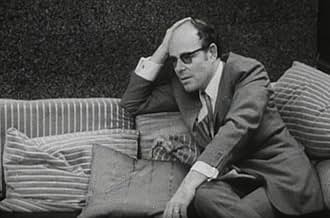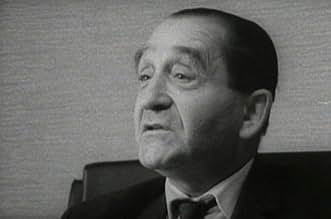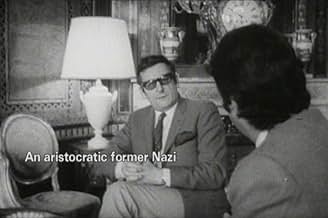अपनी भाषा में प्लॉट जोड़ेंAn in-depth exploration of the various reactions by the French people to the Vichy government's acceptance of the German invasion.An in-depth exploration of the various reactions by the French people to the Vichy government's acceptance of the German invasion.An in-depth exploration of the various reactions by the French people to the Vichy government's acceptance of the German invasion.
- 1 ऑस्कर के लिए नामांकित
- 6 जीत और कुल 2 नामांकन
- Self, former Wehrmacht Captain
- (as Helmuth Tausend)
- Self, general in the Wehrmacht
- (आर्काइव फ़ूटेज)
- (as General Stummel)
- Self, SS commander
- (आर्काइव फ़ूटेज)
- (as Zepp Dietrich)
- Self
- (आर्काइव फ़ूटेज)
- Self
- (आर्काइव फ़ूटेज)
- self, Former Mayor Of Combronde
- (as Monsieur Leiris)
- Self
- (आर्काइव फ़ूटेज)
फ़ीचर्ड समीक्षाएं
Focusing on the town of Clermont-Ferrand, Ophüls tries to understand what it was to live with German soldiers in your town, an optimistic and collaborating government, an exiled general urging you to resist and underground organizations who used terrorism as their only weapon. Ophüls does not multiply the number of interviewees. He chooses about 15 of them and interviews them long enough that you understand their comments within the context of their personality and outlook. But the most surprising is the variety among the interviewees: a very courageous farmer, a reckless British spy, a British minister, a self-sufficient German general, a doubting German soldier, a chauvinistic bourgeois, a young nobleman attracted by the Nazi theories, a young disillusioned nobleman-philosopher ready to sacrifice his life, a clear-sighted Jewish government representative, a naïve woman, a Communist, a nationalist. You'll be surprised to find out who is the most perceptive of the bunch
Thirty years down the road, Ophüls' methodology is as interesting as the history he tells. Merely claiming that Ophüls had an argument seems to work against the surface of his film, for he disguises his point of view, his argument, behind the reminiscing of his interview subjects. The film is a classic of humanist culture in large part because Ophüls, in giving the people the chance to say their piece, apparently puts his faith in those people (and in the audience that watches them) to impart "truth." However, the filmmaker is much cannier than this; he is not artless. The editing of the various perspectives in the movie allows the viewer to form conclusions of their own that don't always match those of the people who are doing the talking in the film. In fact, The Sorrow and the Pity makes great demands on the viewer, not just because of the film's length: Ophüls assumes you are processing the information he's providing, and so the film gets better as it progresses, with the viewer's attention being rewarded in direct correlation with the effort you put in.
And Ophüls is himself the primary interviewer in the film; you don't often actually see him, but he's there, asking the questions, leading on his subjects and his audience, only partly hidden (visually and philosophically) from view. The movie might look easy; there are none of the showy flourishes of a Kubrick or Stone here (or of Max Ophüls, for that matter). But the viewer is advised to remember that Ophüls' guiding hand is always in the background, constructing the film's version of the truth just as the characters do in their stories.
Boy was I wrong. This turned out to be one of the most engrossing films I've seen. Yes, it is too long. But you're willing to forgive it that. This is simply the best film I've seen on World War II. Numerous interviews with French politicians, teachers, shop keepers, peasants, hoteliers, and more along with ones of Germans and Englishmen gave one of the most revealing and human portraits of World War II - and of the French people - I've seen. Combined with included archival footage from the war, this made for what is clearly one of the great all time documentaries and greatest WWII films I've seen.
TSATP draws you in right away and really never lets up. Almost every interview enlightens in some way. Everybody talking has their own agenda - spin in modern parlance - but the director is able to combine these in a way that exposes the most blantant of falsehoods and also paints a realistic composite portrait. The Nazi propaganda films were also chilling. One early example is a film of black and arabic French soldiers captured by the Nazis with the implication that racial impurity led to the French demise.
I could go on and on about this but I think I'm running out of room and need to talk about the DVD. I highly recommend this film for anyone who wants to go beyond history book versions of the war.
As for the DVD version itself, there are several flaws, starting with the $50 price tag. Beyond that, the print used was a poor one. The quality of the interview scenes was not much better than that of the archival footage spliced in. The subtitles were also not that great. Interestingly, much of disc two appeared to have a remixed soundtrack. For interviewees in English and German, the director dubbed over a partial French translation with the original language reduced in the background. This partial French translation was then subtitled in English (and not always well). On disc two, quite a few of the English sections did not have French dubbing or subtitles, which is where I suspect the sound remix comes in. The ending was also quite abrupt and choppy (Maurice Chevalier in English?) and didn't have the feel of being original, though let me stress I've no real knowledge to substantiate this.
क्या आपको पता है
- ट्रिवियाOriginally intended for French television. However, French broadcasters refused to show it arguing the documentary depicted occupied France as exclusively populated by traitors.
- भाव
Dr. Claude Levy: France is the only government in all Europe whose government collaborated. Others signed an armistice or surrendered, but France was the only country to have collaborated and voted laws which were even more racist than the Nuremberg laws, as the French racist criteria were even more demanding than the German racist criteria. It's not something to be proud of.
- कनेक्शनFeatured in Annie Hall (1977)
- साउंडट्रैकÇa Fait d'Excellents Français
Music by Georges Van Parys
Lyrics by Jean Boyer
Performed by Maurice Chevalier
टॉप पसंद
- How long is The Sorrow and the Pity?Alexa द्वारा संचालित
विवरण
- रिलीज़ की तारीख़
- कंट्री ऑफ़ ओरिजिन
- आधिकारिक साइट
- भाषा
- इस रूप में भी जाना जाता है
- The Sorrow and the Pity
- फ़िल्माने की जगहें
- Clermont-Ferrand, Puy-de-Dôme, फ़्रांस(Main location)
- उत्पादन कंपनियां
- IMDbPro पर और कंपनी क्रेडिट देखें
बॉक्स ऑफ़िस
- US और कनाडा में सकल
- $13,082
- US और कनाडा में पहले सप्ताह में कुल कमाई
- $5,224
- 26 फ़र॰ 2023
- दुनिया भर में सकल
- $13,082
- चलने की अवधि4 घंटे 11 मिनट
- रंग
- ध्वनि मिश्रण
इस पेज में योगदान दें




























